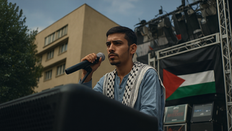

“If Gaza were your world, would you still stay silent?”
A four-minute poetic film confronting
silence in the face of Gaza’s destruction.


Synopsis
STOP is a 4-minute poetic film that confronts silence and fence-sitting in the face of Gaza’s destruction. Symbolic figures — voices of conscience rather than portraits of individuals — are torn from their constructed worlds and placed inside Gaza’s nightmare. There, they become a chorus of witness, refusing indifference and asking the stark question: if what happened there happened to you, would you stay silent? Set across restaurants, offices, therapy rooms, and public spaces, the film interrupts the everyday with voices that refuse complicity. Drawing on the form of Greek tragedy, STOP transforms poetic language into a collective act of moral resistance. Built using a mix of AI and traditional filmmaking — generative imagery, facial mapping, and recorded voice performances by the filmmaker and other actors — STOP is both artwork and testimony: an urgent act of witness carrying Gaza into spaces where it is too easily ignored.

Director's Statement
I made STOP out of a growing unease with silence — silence in the face of Gaza’s devastation, silence in the face of atrocity carried out in real time, silence that becomes complicity. The film is not a documentary, nor an essay, but an act of witness. It asks those who hesitate, those who weigh and nod and find excuses, to look directly at what is happening and to ask themselves a simple question: if it were me, could I still stay silent? The figures in STOP are not realistic portraits or characters drawn from life. They are symbolic players — a collective voice of conscience, speaking in poetic lines rather than natural dialogue. Each exists to carry a fragment of the poem, forming a chorus that bridges the space between the viewer and the events they witness. Like figures in a Greek tragedy, they are there to confront, not to imitate. Their purpose is to keep our attention fixed on what we would rather ignore. The film was built using a blend of AI and traditional techniques: generative models for imagery and motion, human facial performances mapped onto AI characters, and voice performances recorded by myself and other actors. Grounding the AI figures in real performances gave them tone, cadence, and breath — keeping the emotion human, even within synthetic form. STOP sits within a lineage of my earlier films that responded to war, disinformation, and indifference. Works such as What Barry Says, Coalition of the Willing, Taking Liberties, and Ghost in the Machine were also born from the conviction that film can resist silence — that it can carry a message into spaces where it might otherwise be excluded. This new work continues that tradition, but in distilled form: a poem performed as cinema, set against a world collapsing. Ultimately, STOP is not about me, nor even about the fictional figures who populate it. It is about the audience — about you. If what you see unsettles you, if it forces you to imagine Gaza as your own life torn apart, then the film has done its work. And if that happens, I ask only one thing: do not keep it to yourself. Share it. Simon Robson

STOP - The Poem
STOP began as a poem — a plea against silence.
Stop the chatter, the discourse, the careful debate, Stop the nodding, the weighing, for intellect’s sake. Stop the platitudes served between entrée and wine, Stop the fence-sitting, “both sides” you endlessly chime. Stop the scrolling, the likes, the measured concern, Stop the world, and bear witness—because Gaza starves and it burns. If you were there as the ground burst beneath your feet, If you were there as your child was laid to rest under hundred-ton sheets. If you were there as the light in their eyes flickered out in your arms, If you were there as your brother was torn like a rag doll, limp and unarmed. If you were there as sniper fire pierced the hearts and heads of children, every death another gruesome score, If you were there as they starved you, then fired as you reached for food - and called it war. There’d be no theories, no balanced debates, No careful discussions of context or fates. Your fabric of selfhood would fray and unthread, Your spirit would shatter as you gathered your dead. Because you—who debate them in comfort, alive— You Would crumble in seconds where they must survive.

Press & Screenings
Festival submissions in progress — updates coming soon.

About the Film maker
Simon Robson is a filmmaker whose work doesn’t ask permission. What Barry Says—a furious, two-minute broadside attack on The Project for The New American Century spread globally in 2004 and picked up festival prizes. He went on to direct the animated sequences within Taking Liberties (2007), a BAFTA-nominated documentary on the erosion of civil liberties in the UK under the Blair government. Robson then convened Coalition of the Willing (2010), a many-hands collaboration arguing for bottom-up climate action. His later short Ghost in the Machine, confronting ocean plastic pollution, won Best Animation at the Cornero Film Festival in Italy. Robson keeps making difficult films—often at personal and professional risk—because the stakes demand it. His new work, STOP, is a direct challenge to fence-sitting and moral distance on the genocide still unfolding on Gaza. The film asks whether we’d still sit on the fence if it were our own homes and families under siege.
Created by Simon Robson. Produced independently, 2025.













